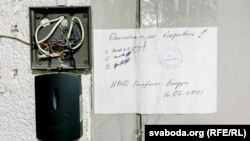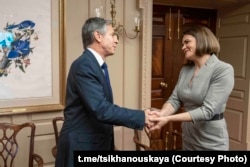Ahead of the first anniversary of the launch of Belarus’ massive protests against suspected rigging of the country’s August 9, 2020 presidential election, the Belarusian government has declared a national crackdown on media and non-governmental organizations supposedly involved in the “shadowy” financing of protests against the de facto rule of Alyaksandr Lukashenka.
But with journalists fleeing the country to continue their work online, how effective this campaign can be is open to doubt, some Belarusians believe.
Overall, since July 9, police have conducted raids on 63 newsrooms and journalists’ residences, the Belarusian Association of Journalists, another raid target, announced on July 18. Thirty-three journalists are currently in prison.
On July 16, police detained five journalists from two of the largest independent sources for Belarusian news: Radio Free Europe/Radio Liberty, of which Current Time is part, and the Poland-based Belsat broadcaster.
That trend continued on July 19, when three journalists from the provincial outlet Regionalnaya Gazeta (Regional Newspaper) were detained about an hour to the northwest of the capital, Minsk.
Belarus claims grounds exist for its actions. On July 16, the country’s main investigative body announced that it possessed “reliable information” about the participation of media and non-governmental organizations in tax evasion and the foreign financing of protests.
That same day, Lukashenka approved changes to the country’s law on emergency situations that would allow a state of emergency to be declared in response to “disorders” that threaten “the state’s existence” by “attempts to forcibly change the constitutional order, seize, or usurp power.”
Some Belarusian commentators,, though, believe that the government intends its actions against RFE/RL, funded by the U.S. Congress, as a “signal” for the United States, noted RFE/RL’s Prague-based Belarus Service Director Alexander Lukashuk.
Belarusian opposition leader Svyatlana Tsikhanouskaya, whom many consider defeated Lukashenka in the August 2020 presidential vote, arrived in the U.S. on July 18 for an extended trip that includes meetings with Secretary of State Antony Blinken, Undersecretary of State for Political Affairs Victoria Nuland, and National Security Advisor Jake Sullivan as well as with senators and congressional representatives.
Appearing on CNN on July 19, Tsikhanouskaya urged the United States “to help civil society survive” and impose additional sanctions against the Belarusian government for its alleged human rights violations.
In response, Lukashuk commented, Belarusian officials may reason that “’You can meet with her if you want, but we’ll do everything we want with your equipment, with your buildings, with your flags, with your people who were working for you.’”
Calling for the release of imprisoned RFE/RL journalists Ales Dashchynski, Aleh Hruzdzilovich, and Ina Studzinskaya, RFE/RL President Jamie Fly charged that the government's measures “testify to the despotic desperation of the Lukashenka regime to cling to power at all costs.”
One member of Tsikhanouskaya’s mission to the U.S., Nikolai Khalezin, however, predicted that officials’ “pogrom” only “strengthens our positions” with the U.S.
Other observers wonder if Lukashenka’s primary foreign backer, Russian President Vladimir Putin, with whom he met in St. Petersburg on July 13, influenced Minsk’s actions.
At the meeting, Lukashenka alleged that “abominable” non-governmental organizations “are planting terror” within Belarus. The next day, on July 14, over 50 civil society groups were searched, and at least 20 people detained.
Among their number is the outspoken human rights group Viasna (Spring), whose leader, Ales Bialiatski, reportedly remains in jail after the 72-hour limit for detainees.
But Katerina Shmatina, a Belarusian Institute of Strategic Studies analyst who left the country in 2020, sees no connection between the Putin summit and the latest chapter in the government’s crackdown on critics. Such measures have occurred daily since mass protests against Lukashenka ended, she noted.
Since the spring, aside from the apparently forced landing of a Ryanair jet carrying wanted opposition-activist-journalist Raman Pratasevich, the government effectively closed down the country’s largest independent news portal, Tut.by, and, earlier this month, detained four journalists from one of the country’s oldest newspapers, Nasha Niva (Our Field) for alleged tax evasion. Both outlets’ websites have been blocked.
Ultimately, Shmatina said, “there aren’t any guarantees that anyone now in Belarus is in safety.”
Journalists who have left the country know that all too well.
“Going out onto the street is now practically impossible” for media, commented Current Time’s Belarus correspondent Raman Vasiukovich, who left Belarus before the July 16 raid on RFE/RL's Minsk bureau. Journalists consider conducting interviews on the street, where they can attract police attention, akin to “heroism,” he said, speaking from Kyiv.
Many journalists take with them wherever they go an emergency bag containing their passport, a change of clothes, and a water bottle in case they are suddenly detained, Vasiukovich said.
Vasiukovich previously had been fined for reporting without official accreditation and for supposedly distributing an allegedly “extremist” book about Belarus’ connection with the separatist conflict in Ukraine’s Donbas region.
He said he only decided to leave Belarus at the last moment.
“We journalists should tell what’s going on. This was important so that the whole world would know how human rights are being violated in Belarus, how [police] beat people” at protests, Vasiukovich said. “I considered this my obligation.”
Nasta Zakharevich, an RFE/RL blogger and freelancer for a Spanish news agency, similarly struggled with her own decision to leave Belarus for EU member Latvia, its northwestern neighbor and now home to a sizable Belarusian diaspora.
Before leaving earlier this year, Zakharevich was imprisoned twice -- for 7 and 15 days, respectively – while covering anti-Lukashenka protests. “After the second release, they began to call my relatives,” Zakharevich said of officials. “I took this as an unambiguous sign that, either I leave [Belarus] or they’ll put me in prison.”
She now has permission to stay in Latvia for five years as a political refugee.
Not long after she publicly challenged the veracity of the jailed Pratasevich’s remarks at a June 14 press conference, BelaPAN news agency reporter Tatyana Korovenkova also left the country.
The agency had received information that a criminal case “with serious accusations” was being prepared against her, Korovenkova told Current Time.
The government does not appear to have announced any charges in absentia.
Korovenkova is now working remotely for BelaPAN, which, as of July 19, continued to function. The journalist said her next steps depend on “how events develop.”
Ensuring that Belarusians continue to have access to independent news coverage, despite these departures, is critically important for the rest of Belarusian society, believes Dmitry Navosha, the Belarusian-born co-founder of Russia’s Sports.ru portal and an outspoken critic of Lukashenka.
“Fortunately, despite the total pogrom against Belarusian media, a lot of journalists understand that they need to continue working in any conditions, even if those conditions force you to leave for Poland, Ukraine, Lithuania, Latvia, or some other countries,” commented Navosha.
After the government this May disabled Tut.by’s website, placing its editor in chief in jail,
editorial staff outside of Belarus launched a fresh news site called Zerkalo (Mirror).io.
Although the Internet outages that marked the start of Belarus' protests in August 2020 could interfere with such missions – the government controls all Internet Service Providers – these measures have not yet occurred.
The deputy director of the Belarusian Association of Journalists, Aleh Aheyeu, believes that the crackdown could actually prompt stronger consumer interest in the independent, professional outlets that still operate.
The number of such outlets, however, is steadily decreasing. Out of some 10 independent, national or international media offices or Belarusian Telegram channels covering the August 2020 protests, only one, Onliner.by, has not been targeted by investigations, according to Current Time’s reporting.
Kirill Martynov, the political editor of Russia’s Novaya Gazeta, believes the reason for this scrutiny may lie in the Soviet past.
Like their Russian counterparts, Belarusian officials use “Soviet logic” and see journalism as “the ultimate cynical, corrupt profession” that selects news stories based on who pays the most for that coverage, Martynov commented.
News outlets critical of the government are routinely depicted as Western hirelings attempting to advance Lukashenka’s removal from power.
The U.S. and European Union have deplored the media crackdowns, with European Union’s foreign policy chief Josep Borrell warning on July 15 that the EU “is ready to consider further restrictive measures” against Belarus.
In a July 19 interview with Sky News Arabia, though, Lukashenka expressed no concern about sanctions.
“We’ll see what other nastiness they can throw at us, and prepare for this,” he said.













